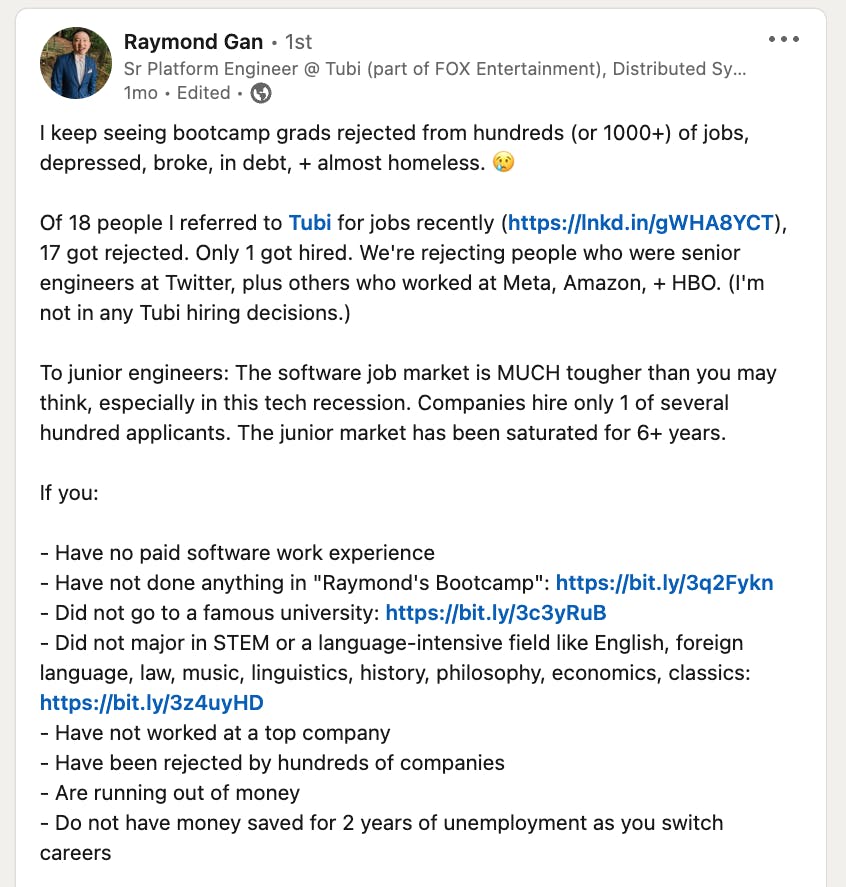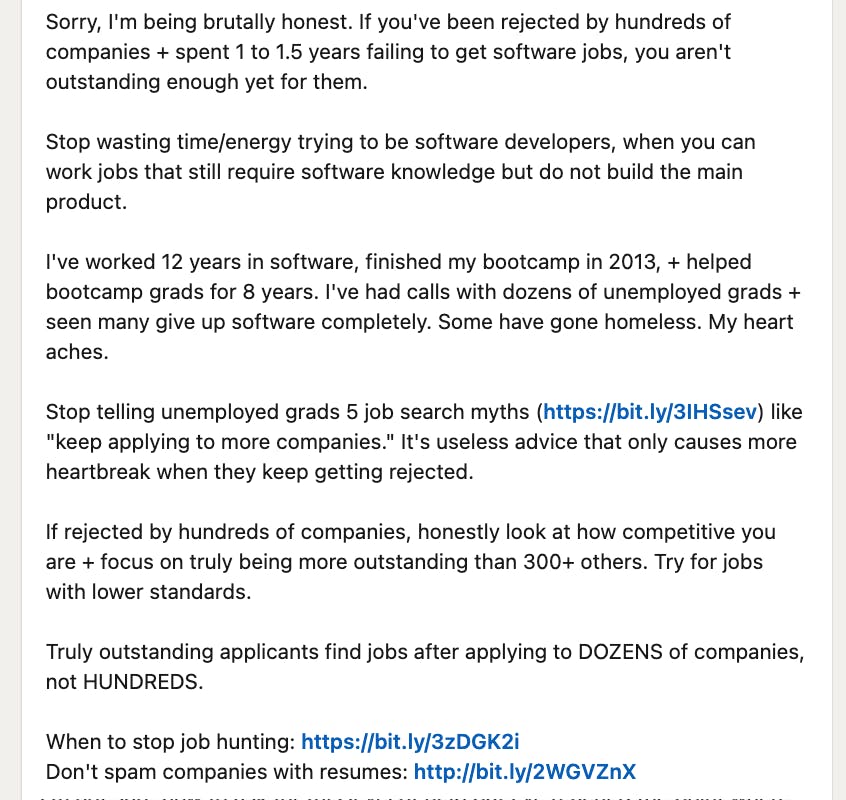
Photo by Tegan Mierle on Unsplash
Data Science Bootcamps: How To Not Get Screwed & What To Look For To Get The Highest ROI Possible
A system of education is not one thing, nor does it have a single definite object, nor is it a mere matter of schools. Education is that whole system of human training within and without the school house walls, which molds and develops men. — W. E. B. Du Bois
During my journey breaking into data science (and eventually MLOps), I’ve done a couple of boot camps or paid workshops.
My experiences were generally positive (even if I only managed to fully complete 1 out of my 3 attempts) and there are several scenarios where a boot camp can be the superior option (as opposed to a degree or self-study) when making a career switch.
However I also recognize there have been just as many, if not more, stories where boot camp graduates were unable to recoup the cost of the boot camps and where attending a boot camp was a really bad idea.
The goal of this blog post is to:
Describe my Data Science boot camp experience;
Propose some criteria to use when evaluating boot camps;
How to decide whether a boot camp is right for you.
📝 What is a Bootcamp & Are There Different Kinds?
Coding boot camps first started popping up in 2011.
Bootcamps like Hack Reactor (est 2012), General Assembly (est 2011), Flatiron (est 2012), and many others were just kicking off within those first couple of years.
The premise was that within a relatively short time (4-5 months) of intensive studying and hands-on mentorship, graduates would exit with the 80-20 skills needed to get a job as a full-time software engineer in the industry. The original boot camps often required a full-time commitment, in-person classes, and cohort sizes of 10-30 aspiring software developers.
Video: Interview/news coverage from 2016
The main rationale for why boot camps could be as effective, if not more than a traditional 4-year undergraduate degree, was that most CS programs didn’t focus on web or mobile development, which was most of the jobs at the time.
Since then the boot camp structure of learning has expanded outside of front-end development to other disciplines like data science, product management, and even MLOps with more flexible arrangements that no longer require attendees to quit their jobs for 6 months, take out a loan, and forgo earnings (or social lives).
Many factors impact the structure (and experience of a boot camp) including:
Factors That Impact The Bootcamp Experience
✅ Full-time vs Flex | Is the program a full-time program with mandatory courses, lectures or sessions at specific times? |
✅ In-Person vs Remote vs Hybrid | Are you expected to attend the entire program in person? |
✅ Self-Paced vs Not | Is there a timeline for the program that you’re required to follow? |
✅ Job Placement Guarantee | Is there a job placement guarantee? |
✅ Program Structure | What will you be working on? |
The program and boot camp structure will impact the following factors that you'll need to consider.
Factors That Will Impact Your Bootcamp Attendance
| ✅ Direct Cost | How much is the program going to cost you out-of-pocket? |
| ✅ Opportunity Cost | What can you and will you give up to do the program? |
| ✅ Cost Structure | What payment options does the program offer? |
| ✅ Risk | What can you afford at the end of the day? |
Why Direct Cost?
Generally the most expensive types of programs or boot camps:
require in-person participation,
involve pair-coding,
have an assigned mentor,
offer a job placement guarantee,
offer scholarships.
The least expensive programs (at least on paper):
allow flexible timelines,
are self-paced,
have a hands-off approach,
don’t offer a job placement guarantee.
Why Opportunity Cost?
Will the program require you to quit your job or force you to decrease your billable or work hours?
Is the program pricey enough that you’d need to consider taking out a loan?
Why Cost Structure?
Does the program offer a scholarship (that you would qualify for)?
Does the program require a flat payment or a monthly payment?
Instead of either of those options, does the program offer an ISA?
Why Risk?
Can you afford to quit your job?
Are you the sole breadwinner for your household?
Worst-case scenario planning – if you quit your job, take out a loan for an expensive program, and then are unable to find a job after, how screwed are you, both financially, emotionally, and professionally?
🙅♀️ Why Bootcamps Get A Bad Rap
As you can tell, picking the right boot camp (and figuring out whether you should even do a boot camp or a more traditional program) requires exhaustive research.
Deciding on a course of action for becoming a data scientist is also an exhausting, personal exercise. You should understand what the direct cost, opportunity costs, and risks look like for yourself and your family.


There are incredibly sad stories of boot camp graduates going through expensive programs (oftentimes requiring loans), shelling out anywhere from $15-20K, only to find out that the program didn’t teach them the necessary skills to get a job and was still searching up to 1.5 years later. These boot camps would sell them on the dream of being able to move up in their careers, take their money, and give them no support.
And for every good boot camp, there’s going to be 2-3 mediocre boot camps with another 1-2 fraudulent or scam ones.
Oftentimes the quality of the boot camp also depends on the quality of the instructors and mentors.
Compensating working, high-quality software developers is expensive and increases the cost of the program. Many boot camps find it easier to promote graduates to mentors and instructors.
On the one hand, inviting alumni back to teach or mentor can improve the quality of the student experience, especially as mentors or instructors that have had the opportunity to work in the industry can bring lessons back from the field to augment the curriculum.
On the other hand, this can also lead to a feedback loop of the “blind-leading-the-blind” where instructors or mentors aren’t able to provide the kind of feedback or best practices that the industry expects (since they haven’t experienced it).
Did I Do a Bootcamp & Would I Recommend It
As I mentioned, I’ve had the opportunity at this point to do some paid programs, including two boot camps and one paid workshop. The only one I completed in its entirety was Springboard’s Data Science Track in 2019.
There are other data science programs & boot camps out there like DataQuest, Thinkful, etc which you can read about more in blog posts like this one.
Why did I go with Springboard? Why did I go with a boot camp?
My Criteria
| ✅ Length of program | Keeping the momentum up would be key to continual progress, so preferably =< 6 months. |
| ✅ Academic (Master’s) vs Bootcamp | This was an easy one as basically all the grad schools I called said “no” (apparently no one’s in a rush to enroll a dunce cap-wearing, 2.3GPA wielding troglodyte). So boot camp it was. |
| ✅ Full-time or Part-Time | The opportunity cost of a full-time program, aside from the cost of the program, included missing out on earned income + gaining experience in that time. (San Francisco rent is also insane) |
| ✅ Cost & Payment Plan | The cost needed to be less than $10k. Springboard came in at $1.5K per month with the monthly plan which was incredibly affordable, especially on a cash basis. |
| ✅ In-person or Remote | Although I enjoy in-person classes, traffic & commuting in SF are nightmarish. Remote also meant I could structure my study around my work hours. |
| ✅ Program Structure | Essentially I identified 3 key components as being important to me: mentorship, project development, and career assistance. My program needed to meet these criteria (but not much else). |
To summarize: At less than $1.5K per month (spread out over 6 months), with a weekly mentor check-in, and decent course material (curated from external sources), Springboard seemed like a great option. I would also have two machine learning projects that I could take to potential recruiters. An additional benefit was that as part of the program, Springboard partners with DataCamp to give you access for 6 months after the program ends.
Full-Transparency: While working at Autodesk (before joining WalkMe, the company I was at while doing Springboard), I was making $110K – I was still making around the same amount when I moved to WalkMe to work as a sales analyst. I had at least $40K saved up (if I recall) so by working full-time & doing the self-paced (cheaper) version of the program I didn’t have to dip into my savings & could still enjoy a relatively high-quality life.
Also in the past couple years it came out that a DataCamp founder (or one of the execs) harassed a female employee. I'm much less inclined to recommend them. Instead go for Udemy, 365 Data Science, Coursera, or Dataquest.
But before taking my positive experience as an endorsement that ANYONE & EVERYONE should consider a data science boot camp, I need to point out some key facts.
I did a TON of research into the different boot camps and programs.
I settled on the best option which was:
Available to me (masters programs said NO).
Was better than self-learning ( which I had been doing & failing at).
I picked the best financial option, regardless of whether there was a job placement guarantee or not (there wasn’t FYI).
I picked the option that meant:
I didn’t have to quit my job (I kept earning money),
I didn’t have to take out a loan (I just didn’t get to save money),
Payments were made monthly which meant I could quit the program at any point in time if I didn’t feel I wasn’t getting value from it,
I didn’t have any dependents or major debt like student loans or mortgages.
I had 6 months of emergency savings if I needed to dip into it.
I cannot emphasize enough how privileged my financial state was and I still didn’t go for the most expensive, in-person program.
I went for the one that if everything went wrong, I could live with that decision.
And this is partly why boot camps have a bad rap, is because they overextend their promises to their students and students treat boot camps like silver bullet solutions.
Most importantly,
Even if I didn’t get a job, I was going to learn a lot in a relatively short time, & get some great advice & mentorship.
No matter how badly my actual job transition went, I was going to learn some valuable skills, finally, produce some projects for my portfolio, and learn from an awesome mentor in the industry (Rajiv Shah).
For example, “Springboard’s program focused on python and I went from having never, ever, ever touched python to learning how to leverage core data science libraries like numpy/pandas/sklearn/seaborn/seaborn, being able to roughly describe various tasks & concepts in machine learning and build some decent classical machine learning models.” (from a prior blog post)
I went from essentially being able to identify lego pieces in the data science bucket to putting together a lego house with lego streets.
If you’re interested in further details about my Springboard bootcamp experience, the original medium post is here: 💈 Breaking into Data Science — Upskilling & Bootcamps (Ch.2)- 📊
🤷🏻♀️ So Should You Do A Bootcamp OR What Should You Do Instead?
First, ask yourself (and the boot camp) all of the following questions and factors I’ve listed above.
Second, can you answer “Yes” to at least 80% of the following questions:
[Yes/No] I have tried to learn on my own, using free resources on Youtube, Freecodecamp, etc.
[Yes/No] I have tried to create my projects using SQL and Python or R, either through tutorials or from scratch.
[Yes/No] I have invested in lower-cost & lower risk options like Udemy courses, Coursera courses, or subscriptions to learning platforms.
[Yes/No] I have tried creating notebooks on Kaggle and analyzed data.
[Yes/No] I have picked a data science book (like Python for Data Analysis, Hands-On Machine Learning with Scikit-Learn) and coded along in an IDE locally, a notebook (like Colab) or using a different Python or R editor.
[Yes/No] I have tried to pick up basic programming meta-skills like using Git, command line tools, and editors using The Missing Semester of Your CS Education.
[Yes/No] I have tried to find opportunities in my current role (or outside) to do data science and machine learning projects, even if those opportunities were self-driven and unofficial.
Finally, assuming you’ve answered “yes” to at least 80% of the questions above, have you still failed to move forward and it’s been at least 3-6 months of making the necessary habit and routine changes but you’re still struggling?
At this point, you’ll want to consider a structured program like a boot camp or master’s degree (or a paid workshop).
However if you haven’t tried a significant portion of the options in Question 2, then a boot camp is potentially a REALLY REALLY bad idea.
Some additional questions you might want to consider:
Are you just starting the data science journey or have been at it for a while?
- i.e. do you need to cover all your foundational bases or do you just need to deep-dive on specific topics
Are you someone that needs structure and hand-holding or someone that prefers a more hands-off self-initiated approach?
- i.e. do you need a step-by-step program with clearly defined deliverables or are you okay with a curated list of resources
Are you someone that needs a consistent, recurring presence or prefers to reach out when you’re stuck?
- i.e. do you need a mentor or a support community or both
What specific outcomes are you hoping to achieve besides learning the skills?
- i.e. Are you hoping to have a portfolio of projects? Referral network? Community? Etc etc
🤔 What About A Master’s Program
As I mentioned, a master’s program wasn’t an option for me because of my undergraduate GPA (which was about ~2.6/4.0, roughly a C+ average).
There are many folks I know in the data science community who did Masters programs and I’ve linked their videos below.
There probably is a certain amount of survivorship bias going on, as I’ve mentored plenty of Master’s and PhD degree holders that weren’t able to break into data science without months (to a year) of intense interview prep and upskilling in software development and programming.
Check out their experiences and be sure to remember that:
Degrees don’t guarantee jobs, they just help you get your foot in the door for interviews (same with boot camps).
They can be much more expensive than other forms of upskilling.
Oftentimes are full-time.
Typically still don’t come with job guarantees (like many boot camps).
Conclusion
Hopefully, you were able to take away the following:
What my Data Science boot camp experience is like & why it worked for me;
The factors you should consider when choosing whether to go the boot camp route;
How to pick the right boot camp for you (if you do decide it's the right route).
Final Comments
Look, I never want to deter anyone from taking steps to break into tech.
Going into analytics, then data science (and now MLOps).... they were all great decisions and I don't regret any of them.
But sometimes social media is one big lie and for every individual that quit perfectly okay jobs without a safety net to go do an expensive program that didn't guarantee a job placement and succeeded, there are probably another 3-4 we don't hear about.
Something that self-learning teaches you is how to create habits and discipline that will serve you well, especially when doing a program.
And there are plenty of free or cheap resources that I would highly encourage you to consider first.
If you're interested in learning more about my crazy transitions and what I'm working on currently, feel free to check out my socials and to also check out the following videos and blog posts.




